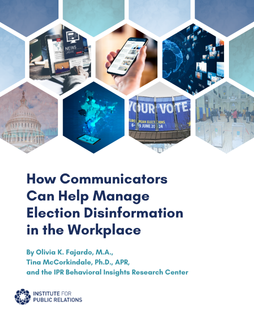Leaders are crucial to the success, image and future of nations, organizations, and professions. However, few studies have directly examined leadership in public relations. To deal with this knowledge gap, the Plank Center for Leadership in Public Relations, established at the University of Alabama in 2005, has begun to build a research-based foundation of knowledge in this area. To date, 16 leadership studies have been carried out through the Center, involving surveys, interviews, and focus groups with nearly 3,900 PR practitioners, educators, and students.
Nine Qualities of Excellent Leadership in Public Relations
Many of the studies focus on the qualities of “excellent leadership” in public relations, or what practitioners suggest is the best or “ideal” leadership. We recently analyzed the 16 studies to locate recurring themes or patterns, and we identified nine qualities, or principles of excellent leaders. Our analysis suggests that excellent leaders in PR:
- Lead by example: they model the way through two-way communication and exemplary behaviors. Senior leaders said thatrole models and mentors exert the greatest influence on practitioner beliefs about leadership qualities and values. Young PR leaders suggested that “leading by example” is a crucial quality of excellent leaders.
- Participate effectively and credibly in strategic decision-making in organizations. Strategic decision-making capability is the most important dimension of leadership, according to senior practitioners: the ultimate PR leader is a valued strategic counselor who’s engaged in key decision-making moments.
- Exemplify a strong ethical orientation and set of values for doing the right thing and practicing professional standards at all times. Ethical orientation touches every aspect of practice and is crucial to individual reputation, organizational success, and the profession’s image. PR students defined leadership primarily through an ethics prism, emphasizing trustworthiness and strong values.
- Possess complex communication and rhetorical skills. We take this knowledge requirement for granted, but research reveals the multi-layered nature and complexity of this capability and suggests four levels of knowledge and skill. These include a basic technical skills level; a strategic level associated with planning; a relational level emphasizing interpersonal skills; and a political level requiring rhetorical and persuasive communication skills.
- Possess clear self-knowledge that guides successful interactions, formation of relationships, and self-development. Self knowledge–knowing the strengths and limitations of one’s character, skills, and knowledge–helps guide successful decisions and enables practitioners to interact more effectively with others.
- Possess a strong desire to lead. Individual initiative and desire to lead may be fundamental to excellent leadership over the long term. The desire to lead is a rich, continuing source of energy, power, learning, and determination.
- Employ transformational and inclusive styles of leadership that are sensitive to context and individual needs and differences. Surveys show that PR professionals strongly prefer transformational and inclusive leadership styles. Transformational leaders have a vision for the future, motivate change, and inspire others. Inclusive leaders collaborate, share decision-making, and engage in participative processes. Both styles are more effective in gaining trust with employees, managing hopes and frustrations, and resolving conflicts.
- Demonstrate passion for the work and the profession that encourages and inspires others. Passion for work and the profession may be the lifeblood of leadership. Exhibiting passion and positive energy brings projects to life, spurs hope, and builds esprit de corps. Excellent PR leaders fully engage in the challenges of leadership on the job and often in the community and profession.
- Serve as agents for change and for helping to create a culture for communication. PR leaders may be most effective in open communication environments and when organizational leaders support and model ethical behaviors. Thus, excellent PR leaders push back on restrictive or closed communication environments and inappropriate behaviors for the benefit of employees, the organization, and the profession.
More Research to Do
The 16 Plank Center studies in PR leadership collectively represent a small but important step in building a research-based foundation of knowledge in this important area. Clearly, more research is necessary to confirm these findings, refute them, or discover other important qualities and dimensions of excellent leadership in PR.
Indeed, we hope these studies inspire more research and provoke more academic and professional debate about this crucial but often invisible topic. We believe the future of our profession is closely linked to better understanding and developing excellent leaders, and that starts with research.
This summary is part of a presentation that was delivered at the PRSA International Conference in November in San Diego by Berger; Keith Burton of GolinHarris; and Ron Culp of Ketchum.





There are tens of thousands of leadership studies, theories, frameworks, models and best practices. And, as my clients Dave Ulrich and Norm Smallwood of The RBL Group note, there are a tremendous number of conflicting theories and writing about what is good leadership. Leadership consultants and practitioners continue to devise new competency models every year. In The Leadership Code, Dave and Norm synthesize twenty years of research around what really counts. One of the most surprising findings? 60-70% of what good leaders do is common to any leader in any type of organization. The startling implication of this is that a huge amount of time and money is wasted trying to discover something that is not unique. The remaining 30% that’s unique concerns how leaders connect employees to outside stakeholders such as customers.
One one hand, I agree with Mr. Radoli. These findings do not present any new enlightenment that one could not have found written about leadership in other fields. Much of it is already intuitive. I’m not certain that there actually was a “knowledge gap” in this arena, and one other quality of leadership might have included spending your R&D;money on more urgent, more useful studies.
On the other hand, now that the research is in, how do we better impress upon PR professionals to “walk the talk.”
I totally agree with Don and Brook: these are qualities any manager and leader should possess to do the job properly.
I would add to #5 that a PR leader should also have in-depth knowledge of the skills and competencies required to do the various tasks involved in communications, to be able to delegate the job to the right people. Writing, design, planning, media outreach all require a specific set of skills. In many organizations with limited resources, these tasks are dispatched to whomever is around, sometimes regardless of their competencies or preferences. A successful leader knows what is required for each tasks and knows who best can handle them.
Excellent summary. I’m a doctoral student with years of leadership experience in corporate and agency public relations. Understanding leadership is critical in this profession and, particularly, these times. Economic, technological, and other factors require many new practitioners (most of whom do not have direct reports) to take on significant responsibility and exhibit solid leadership qualities. These skills and behaviors are rarely honed through undergraduate education or internships, so the actions and decisions that senior leaders model truly set the tone for the next generation of practitioners.
Good article. I agree with Don—these qualities are integral for any good leader, professional or otherwise. I would add that possessing a strong EQ (Emotional Quotient) is also vital in effective and lasting leadership. #7 touches on this.
Thanks for the post.
http://www.plainclarity.com
Many would argue that the nine qualities of so called “excellent” PR leaders could apply to and are indeed indispensable to any inspiring and charismatic leader in any field. It is a sad comment on PR leadership if we still have to research these qualities instead of practicing them. The wheel has already been invented—go on and walk the talk.